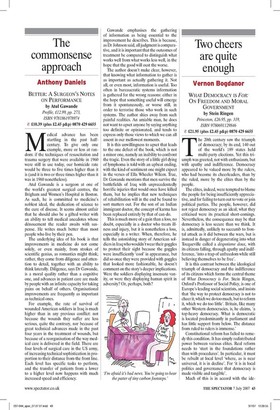The commonsense approach
Anthony Daniels BETTER: A SURGEON'S NOTES ON PERFORMANCE by Atul Gawande Profile, £12.99, pp. 273, ISBN 9781861978974 © £1039 (plus £2.45 p&p) 0870 429 6655 Medical advance has been startling in the past halfcentury. To give only one example, more or less at random: if the techniques of resuscitation and trauma surgery that were available in 1960 were still in use today, our homicide rate would be three to five times higher than it is (and it is two or three times higher than it was in 1960 nonetheless).
Atul Gawande is a surgeon at one of the world's greatest surgical centres, the Brigham and Women's Hospital in Boston. As such, he is committed to medicine's noblest ideal, the dedication of science to the cure of disease. It seems almost unfair that he should also be a gifted writer with an ability to tell medical anecdotes whose denouement the reader awaits with suspense. He writes much better than most people who live by their pen.
The underlying idea of his book is that improvements in medicine do not come solely, or even mainly, from strokes of scientific genius, as romantics might think; rather, they come from diligence and attention to detail, together with an ability to think laterally. Diligence, says Dr Gawande, is a moral quality rather than a cognitive one, and advances in patient care are made by people with an infinite capacity for taking pains on behalf of others. Organisational improvements are frequently as important as technical ones.
For example, the rate of survival of wounded American soldiers in Iraq is much higher than in any previous conflict: not because the wounds they suffer are less serious, quite the contrary, nor because of great technical advances made in the past four years in the treatment of wounds, but because of a reorganisation of the way medical care is delivered in the field. There are four levels of surgical care in the US army, of increasing technical sophistication in proportion to their distance from the front line. Each level has specific tasks to perform, and the transfer of patients from a lower to a higher level now happens with much increased speed and efficiency.
Gawande emphasises the gathering of information as being essential to the improvement he describes. This is because, as Dr Johnson said, all judgment is comparative, and it is important that the outcomes of treatment be compared to distinguish what works well from what works less well, in the hope that the good will oust the worse.
The author doesn't make clear, however, that knowing what information to gather is as important as actually gathering it. Not all, or even most, information is useful. Too often in bureaucratic systems information is gathered for the wrong reasons: either in the hope that something useful will emerge from it spontaneously, or worse still, in order to terrorise those who work in such systems. The author shies away from such painful realities. An amiable man, he does not want to upset anyone by saying anything too definite or opinionated, and tends to express only those views to which we can all assent in our mellowest moments.
It is this unwillingness to upset that leads to the one defect of the book, which is not a minor one, namely an inability to confront the tragic. Even the story of a little girl dying of lymphoma is told with an upbeat ending, with the kind of sentiment one might expect in the verses of Ella Wheeler Wilcox. True, Dr Gawande mentions that men survive the battlefields of Iraq with unprecedentedly horrific injuries that would once have killed them, but he implies that new techniques of rehabilitation will in the end be found to sort matters out. For the son of an Indian immigrant doctor, the concept of karma has been replaced entirely by that of can-do.
This is much more of a gain than a loss, no doubt, especially in a doctor who treats illness and injury, but it is nonetheless a loss, especially in a writer. When, therefore, he tells the astonishing story of American soldiers in Iraq who wouldn't wear their goggles to protect their sight because the goggles were insufficiently 'cool' in appearance, but did so once they were provided with goggles that looked more fashionable, he doesn't comment on the story's deeper implications. Were the soldiers displaying insensate vanity, or were they displaying human spirit in adversity? Or, perhaps, both?



















































 Previous page
Previous page